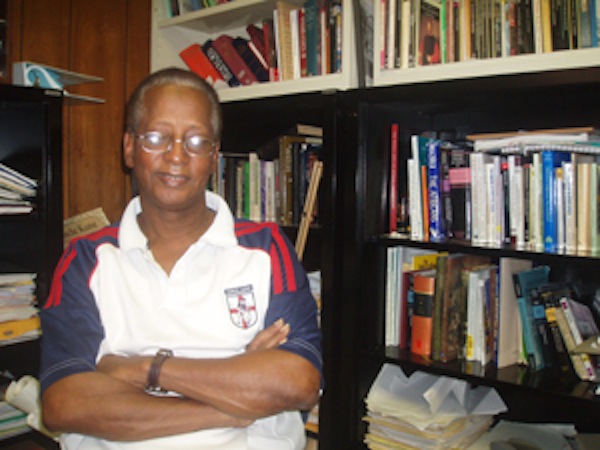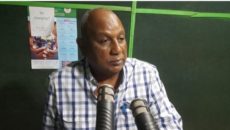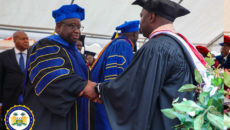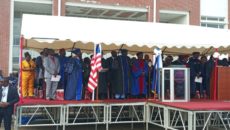Our ranks have been thinned by the passing on April 25, 2017 in Maryland, U.S.A. of Dr. Alpha Bah, one of the very few Liberians trained as a professional historian.
A gentle and soft-spoken man, he was a teacher at heart, captivating the admiration of his many students in Liberia and the United States. He labored throughout his professional career, unearthing the history of the African peoples, especially the peoples of the Mano River Basin – Liberia, Sierra Leone, and Guinea. In his passing we pause to salute him for his contributions to scholarship and to global education.
Born in the Fouta Djallon region of Guinea on May 25, 1943, he was taken at an early age to Freetown, Sierra Leone by his merchant father. There, young Alpha began his formal education at St. Edwards Roman Catholic School where he completed the O Level Certificate before availing himself of an Egyptian government scholarship in 1965 to continue his studies in Egypt.
Four years later, he arrived in the United States and eventually enrolled at Howard University. At Howard, Alpha completed his B.A. degree (cum laude, 1973), two M.A. degrees, one in French literature (1975), and the other in History (1977). His history thesis was: “Herbert Bankole-Bright and his impact on the growth of constitutional government in the development of political parties in Sierra Leone, 1924-1957.â€
At Howard, he received his PhD degree in History in 1983, studying under the renowned Professor Joseph E. Harris. His dissertation topic was “Fulbe Migration, Settlement in Koindu Among the Kissi of Sierra Leone.â€
Bah spoke six languages fluently, including English, French, Arabic, Fula and Creole.
His teaching career began at the University of Liberia while he was researching his dissertation in 1978 in the West African region. He would return to the University briefly upon completing his degree, and then finally as he returned from self-exile in the United States.
In the interim he served as a teacher’s assistant, then lecturer in the History Department at Howard, before serving as a Fulbright Scholar in Residence at Villanova University’s History Department.
He joined the faculty of the Department of History of the College of Charleston (South Carolina) in 1986 where he remained for 22 years, attaining the rank of full professor before his retirement expressly to return to Liberia.
In the early 2000s, Bah joined the ranks of the all-too-few Diaspora Liberians who returned home when peace returned to the war-weary country. There he re-joined the History Department of the University of Liberia, serving concomitantly as the first director of the University’s Confucius Institute from 2008 to his demise.
His activities at all of these universities were many and varied. They were marked by a keen interest in his many students, as well as a solid contribution to scholarship.
At Charleston, he exposed his students to model OAU/AU simulations at Howard University, as well as study-abroad programs during which he led his students to Africa and the Middle East. Of his students, he once said: “I am shy talking about it, but my biggest joy – what is most important to me – are my students. This is my love.â€
Alpha hosted at Charleston a joint meeting of the Liberian Studies Association and the Sierra Leone Studies Association in 1994, and in 2001, the 33rd annual conference of the Liberian Studies Association.
Among his many publications are his book Fulbe Presence in Sierra Leone: A Case History of 20th Century Migration and Settlement Among the Kissi of Koindu and scores of articles including “Rice Culture and the Atlantic Slave Trade†in Les Riz Cultures de L’Afrique de l’Ouest; “The Status of Muslim Minorities in Sierra Leone and Liberia†in the Journal of Muslim Minority; “The 19th century partition of Kissiland and the contemporary possibilities for reunification,†in the Liberian Studies Journal; and “West Africa-South Carolina/Georgia Low Country Connections: Three black Charlestonians in Freetown and Monrovia – William D. Crum, Thomas McCants Steward, and Edward A. Jones.â€
Bah also made notable contributions to “Family Across The Sea,†a documentary that captures the Charleston/West Africa connections.
He was married to Kadiajatu Bah, a physician who pre-deceased him in July 2013. Together they had three now adult children: a daughter, Aissata Bah; and two sons, Chernor Sulaiman Bah, and Mamadou Leypete Bah.
Alpha was also a friend and colleague. For almost a quarter century he and I met almost without fail at annual conferences of the Liberian Studies Association and the African Studies Association at various universities across the United States. For a decade we dutifully showed up with our students at OAU/AU simulation sessions at Howard University, mine from Sewanee: The University of the South.
In the passing of Dr. Alpha Bah we have lost one of a handful of Liberian historians. He was in collaboration with his fellow historians, as well as some of us history enthusiasts trying to address the Liberian national history problem through the now moribund Liberian National History Project.
I read recently reference to the project by Dr. Joseph Saye Guannu and the Rev. Emmanuel Bowier at a forum hosted at the Library of the Liberian National Legislature. Guannu suggested that government facilitators of the project might want to make timely use of the availability and interest of some of my generation for our ranks are fast thinning.
Goodbye Alpha; May your soul rest in peace!



